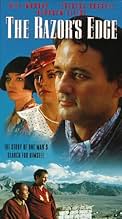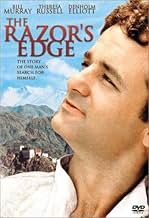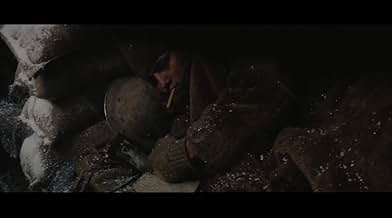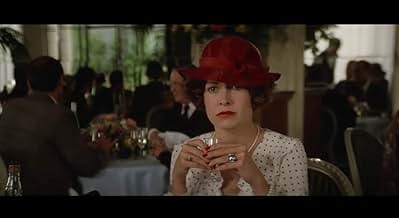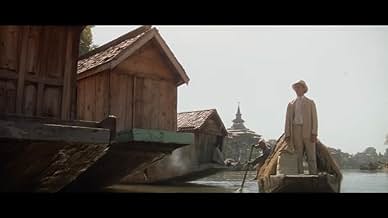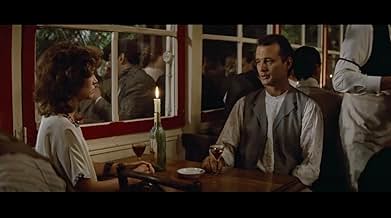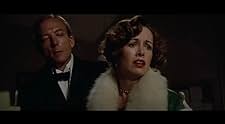IMDb-BEWERTUNG
6,4/10
6177
IHRE BEWERTUNG
Ein amerikanischer Veteran des 1. Weltkriegs (Bill Murray) unternimmt eine spirituelle Reise, die ihn von den Himalayas zurück in seine Heimatstadt führt.Ein amerikanischer Veteran des 1. Weltkriegs (Bill Murray) unternimmt eine spirituelle Reise, die ihn von den Himalayas zurück in seine Heimatstadt führt.Ein amerikanischer Veteran des 1. Weltkriegs (Bill Murray) unternimmt eine spirituelle Reise, die ihn von den Himalayas zurück in seine Heimatstadt führt.
- Regie
- Drehbuch
- Hauptbesetzung
André Maranne
- Joseph, the Butler
- (as Andre Maranne)
Robert Manuel
- Albert
- (as Roberet Manuel)
Empfohlene Bewertungen
Elegant but facile version of the Maugham novel, a passion project for Murray who is good in parts of the film but flat in others. On it's own an okay film hampered by over-length but compared to the Tyrone Power/Gene Tierney original, which has its own problems, it's a pale shadow. A good deal of the fault for that lies in both the direction and the performances. The general ennui of the performances may in fact be laid at the director's feet. All are capable actors as they've shown elsewhere but here be it a mismatch of actor/actress and part or lack of direction most founder.
Theresa Russell does the film's best work but even her Sophie is missing the bruised sorrow that made Anne Baxter's take on the part so compelling and won her the Oscar for best supporting actress. James Keach evaporates from the screen in a rather thankless role that John Payne managed to make an impression in with a show of quiet strength. Surprisingly the weakest of the star spots is Catherine Hicks, usually a very fine actress, adrift in her part. She exudes a warm presence on screen totally wrong for the heartless, mindlessly cruel Isabel that Gene Tierney playing with an icy edge made vivid.
A good try but only average.
Theresa Russell does the film's best work but even her Sophie is missing the bruised sorrow that made Anne Baxter's take on the part so compelling and won her the Oscar for best supporting actress. James Keach evaporates from the screen in a rather thankless role that John Payne managed to make an impression in with a show of quiet strength. Surprisingly the weakest of the star spots is Catherine Hicks, usually a very fine actress, adrift in her part. She exudes a warm presence on screen totally wrong for the heartless, mindlessly cruel Isabel that Gene Tierney playing with an icy edge made vivid.
A good try but only average.
This is one of those films that defines the difference between a "film" and a "movie". Maugham, in print form, often drags; Murray's senses of humor and timing eschew that hurdle and make a beautiful story of growth and epiphany accessible in just two short hours.
The "test" aspect for me here is simple and a bit autocratic, if not downright arrogant as Hell; I don't want to know well anyone who does not appreciate this film.
The "test" aspect for me here is simple and a bit autocratic, if not downright arrogant as Hell; I don't want to know well anyone who does not appreciate this film.
Don't listen to anyone who bashes this film. It is wonderful. I welcome this dramatic role for clown Bill Murray. I saw it the first time when it first came out on video, not knowing what to expect except that it was a drama. I thought the film was fantastic. Murray goes off on a search for himself and the truth, while his friends change and endure their indulgences. A lot to be admired about this film. Not everyone's cup of tea probably, but certainly not the snore fest that others would paint it to be.
The remarks of the detractor in this array of reviews is confusing and confused. Look. I read Maugham's book in the late 40s and saw the Tyrone Power, Gene Tierney, Clifton Webb film. So what? This film was neither one but that's beauty of art, dudes. It doesn't have to. The Razor's Edge is an odyssey of a man in search of himself. The transit nature of life and the brutality of war turn him into a "superfluous" man, who goes off on a quest to find himself. We can inundate this issue with metaphors until the cows come home, but that's Maugham's story. Old Somerset, a closet homosexual who was a volunteer in the horrorific WW1 went through a similar transformation and in a way, this novel, which he began back in the 20s, reflects that journey. Murray takes the character of Larry Darrell into a new domain. Why shouldn't he? He's not Tyrone Power. He's a comedian who plays a tragic role straight. There is much in this film that makes it superior to the 40s version. A stronger statement of the tragedy of the entanglement of the two women and a more intense presentation of the character of Larry. I saw this film when it first aired and recalled a young high school kid remarking to a friend upon exiting, "Man, this is a totally awesome movie." I agree. Alas, the critics and comedy-addicted Murray fa ns didn't and it flopped. Pity. It is a totally awesome movie.
It is a bit surprising that Hollywood ever made a film out of Somerset Maugham's novel "The Razor's Edge". This is because the story has a lot of existential elements and is far from the typical fare coming from the studios. Despite this, they made a 1946 version with Tyrone Power and a 1984 version with Bill Murray. Of the two, I prefer the 1946 version--some of which because it generally sticks closer to the novel. However, being 1946, the sexual elements were sanitized a bit....though it still is superior for several reasons...most notably Bill Murray's odd performance.
The story begins just before the US entered WWI. Some friends are gathered for a party before several of them head to Europe as volunteer ambulance drivers. Not surprisingly, this experience transformed Larry (Murray) and instead of coming home after the war, he stays in France. At first, his girlfriend (Catherine Hicks) supports this bohemian lifestyle for him, but after it's clear he's never returning home to his old patrician life, she marries another man. During the rest of the film, Larry works many low-paying jobs...enough to survive and enough to travel. He's on a journey to explore himself and life and eventually it takes him to India and the East.
At the same time, the film focuses on the folks Larry left behind back in Illinois. While they are all rich, they aren't necessarily happy. Some are a bit screwed up, others are totally out of control. The parallel between these shallow, stagnant rich folks and the poor but happy Larry is the gist of the film.
Bill Murray can be a very funny man and has made some wonderful films. That being said, he's all wrong for the film for two main reasons. Sometimes (particularly earlier in the movie) he seems a lot like Bill Murray, not the character in the novel. He is a bit of a smart aleck and his reactions seem like Murray in "Meatballs" or "Ghostbusters". However, a bit later, he often is 100% deadpan...much like he later did in "Broken Flowers" and "Lost in Translation". But then, oddly, some of the earlier personality and sarcasm still occasionally pokes through...which is not consistent with the story or character. As a result, it definitely blunts the impact of the story...a very important story since it focuses on the meaning of life and is supposed to be a story with great depth.
Another problem, though much less important, is that sometimes the film didn't try very hard to capture the era in which it was supposed to be set. In particular, the lovely Catherine Hicks looks great...and much like a woman who is living during 1984. Her hairstyle is wrong for 1916-1920. Fortunately, when the film got to 1929, her hair was period appropriate.
Overall, an interesting experiment that ultimately fell a bit flat. I appreciate the risk Murray took but ultimately it's a story that just doesn't quite hit the mark. This apparently was the prevailing attitude back in 1984 and the movie lost a lot of money....earning back less than half of its costs.
By the way, I wouldn't mind seeing a third version of this story. The basic story idea by Maugham is laudable...man's search for meaning. But the first film was a bit too tame and the second was just a bit of a mess. I'd love to see one that would correct this as well as sticking very close to the source material.
The story begins just before the US entered WWI. Some friends are gathered for a party before several of them head to Europe as volunteer ambulance drivers. Not surprisingly, this experience transformed Larry (Murray) and instead of coming home after the war, he stays in France. At first, his girlfriend (Catherine Hicks) supports this bohemian lifestyle for him, but after it's clear he's never returning home to his old patrician life, she marries another man. During the rest of the film, Larry works many low-paying jobs...enough to survive and enough to travel. He's on a journey to explore himself and life and eventually it takes him to India and the East.
At the same time, the film focuses on the folks Larry left behind back in Illinois. While they are all rich, they aren't necessarily happy. Some are a bit screwed up, others are totally out of control. The parallel between these shallow, stagnant rich folks and the poor but happy Larry is the gist of the film.
Bill Murray can be a very funny man and has made some wonderful films. That being said, he's all wrong for the film for two main reasons. Sometimes (particularly earlier in the movie) he seems a lot like Bill Murray, not the character in the novel. He is a bit of a smart aleck and his reactions seem like Murray in "Meatballs" or "Ghostbusters". However, a bit later, he often is 100% deadpan...much like he later did in "Broken Flowers" and "Lost in Translation". But then, oddly, some of the earlier personality and sarcasm still occasionally pokes through...which is not consistent with the story or character. As a result, it definitely blunts the impact of the story...a very important story since it focuses on the meaning of life and is supposed to be a story with great depth.
Another problem, though much less important, is that sometimes the film didn't try very hard to capture the era in which it was supposed to be set. In particular, the lovely Catherine Hicks looks great...and much like a woman who is living during 1984. Her hairstyle is wrong for 1916-1920. Fortunately, when the film got to 1929, her hair was period appropriate.
Overall, an interesting experiment that ultimately fell a bit flat. I appreciate the risk Murray took but ultimately it's a story that just doesn't quite hit the mark. This apparently was the prevailing attitude back in 1984 and the movie lost a lot of money....earning back less than half of its costs.
By the way, I wouldn't mind seeing a third version of this story. The basic story idea by Maugham is laudable...man's search for meaning. But the first film was a bit too tame and the second was just a bit of a mess. I'd love to see one that would correct this as well as sticking very close to the source material.
Wusstest du schon
- WissenswertesBill Murray made a deal with Columbia Pictures that he would appear in Ghostbusters - Die Geisterjäger (1984) only if they financed this movie. Originally, no studio was interested in making the film until Dan Aykroyd suggested the deal to Murray. On the final day of shooting, Murray flew to New York City to start filming Ghostbusters.
- Zitate
Tibetan Monk: The pathway to salvation is as narrow and as difficult to walk as a razor's edge.
- VerbindungenFeatured in At the Movies: Choose Me/The Razor's Edge/Full Moon in Paris (1984)
Top-Auswahl
Melde dich zum Bewerten an und greife auf die Watchlist für personalisierte Empfehlungen zu.
- How long is The Razor's Edge?Powered by Alexa
Details
- Erscheinungsdatum
- Herkunftsländer
- Offizieller Standort
- Sprache
- Auch bekannt als
- El filo de la navaja
- Drehorte
- Produktionsfirmen
- Weitere beteiligte Unternehmen bei IMDbPro anzeigen
Box Office
- Budget
- 13.000.000 $ (geschätzt)
- Bruttoertrag in den USA und Kanada
- 6.551.987 $
- Eröffnungswochenende in den USA und in Kanada
- 2.411.311 $
- 21. Okt. 1984
- Weltweiter Bruttoertrag
- 6.551.987 $
- Laufzeit2 Stunden 8 Minuten
- Farbe
- Seitenverhältnis
- 2.35 : 1
Zu dieser Seite beitragen
Bearbeitung vorschlagen oder fehlenden Inhalt hinzufügen



